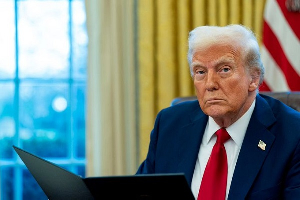Ghana’s duty-free access to the US market under the African Growth and Opportunity Act (AGOA) has been abruptly terminated with a 10% tariff imposition on exports to the US market, marking a significant blow to the country’s export sector.
This follows an announcement by President Donald Trump on Wednesday, April 2, 2025, imposing far-reaching new tariffs on nearly all US trading partners.
China has been slapped with a 34% tax on imports, 20% on the European Union, among others that threaten to dismantle much of the architecture of the global economy and trigger broader trade wars.
Trump, in an announcement, said he was placing elevated tariff rates on dozens of nations that run meaningful trade surpluses with the United States, while imposing a 10% baseline tax on imports from all countries in response to what he called an economic emergency.
Trump said he was acting this way to bring in hundreds of billions in new revenue to the US government and restore fairness to global trade.
“Taxpayers have been ripped off for more than 50 years. But it is not going to happen anymore,” he said.
Trump declared a national economic emergency to levy the tariffs. He has promised that factory jobs will return to the United States as a result of the taxes, but his policies risk a sudden economic slowdown as consumers and businesses could face sharp price hikes.
The White House says the tariffs and other trade imbalances led to an $1.2 trillion imbalance in 2024. Administration officials suggested it could take an extended set of actions by other countries to bring down the new tariffs their imports now face, and retaliatory tariffs by those countries could make the situation worse.
Implications for Ghana’s export strategy
The removal of AGOA privileges represents a major setback for Ghana’s Accelerated Export Strategy, which relies heavily on access to US markets for processed cocoa, textiles, and agricultural products.
The decision could lead to a sharp decline in export revenues, increased costs for Ghanaian exporters, and potential job losses across key industries.
Trade analysts warn that Ghana’s exports could struggle to remain competitive without preferential tariff treatment.
While African economies had hoped for an AGOA renewal, the latest decision suggests a shift towards reciprocal trade agreements, potentially forcing Ghana into a bilateral trade negotiation with the US.
— The White House (@WhiteHouse) April 2, 2025
SP/AE



